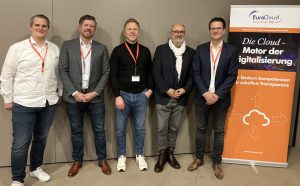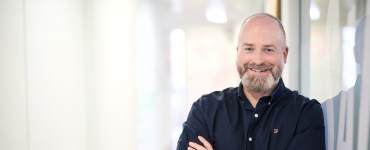Business models in the cloud follow their own rules. In this respect, they challenge people and technology in equal measure. With a new initiative, EuroCloud Deutschland aims to help SMEs IT providers master the transformation. Recently, the EuroCloud Next leaders met as a forum for for the kick-off of IT entrepreneurs of tomorrow.
Digitalising business models and monetising them via the cloud – no matter where system integrators, managed service providers, IT consultancies and agencies move themselves in this direction, this not only releases economic, but also human potential. Think of conflicts that arise, for example, when traditional entrepreneurship meets virtualisation, when experienced Managing Directors are expected to hand over the baton to the next generation, or when a company’s own model of success, which was thought to be secure, crumbles – the cloud newly defines value creation. This new definition was demonstrated at the kick-off for the EuroCloud Next Leaders (ECL) initiative. The EuroCloud Deutschland Forum is aimed at tomorrow’s Managing Directors and entrepreneurs who are prepared to take on responsibility in IT SMEs and the digital economy and drive the change towards the cloud.
Scalable systems release economic levers
At the event on 25 January, CLOUDETEER showed what the revenue sources of the future could look like. “We sell neither hardware nor software,” said Marc Sundermann, founder and CEO of the Hamburg-based start-up, “but only managed services.” To this end, the cloud native service provider breaks down IT landscapes, eliminates unnecessary ballast, standardises services, simplifies applications and reassembles the complete demand in the cloud. “This creates agile, flexible and scalable systems that consume fewer resources, operate more cost-effectively and release economic levers,” Sundermann said. What saves customers costs and effort secures CLOUDETEER’s turnover. The reason is, “instead of administering IT landscapes themselves for longer, the companies let us manage it as a service.”
The cloud challenge: Successors quickly find themselves alone
Business models on a managed service basis follow new rules. Those who used to buy machines, sheet metal and cables now book all resources as needed via the cloud. Term contracts that are billed to the second and can be terminated at any time replace one-off investments. “If you have to prove yourself as a successor in the family business, it’s hard enough,” said Benedikt Kisner, “but if you intend to turn the whole business model upside down, you’ll soon find yourself alone.” At 38, Kisner embodies the new generation as an entrepreneurial personality. He is co-founder of the SMEs system integrators group netgo, resigned from management in autumn 2021, has since worked as a management consultant and now heads ECL.
Succession in your own company: Family always plays a role
It is a brave new IT world that challenges every professional expertise and entrepreneurial attitude in IT SMEs. “After all, nobody gets out of the comfort of their own skin that easily,” said Prof. Dr Volker von Courbière, business coach and trainer for executives, “How well we can adapt to new things depends to a large extent on what we learned and experienced when we were young.” This is how parents, family and school shape our behaviour. “And they do so emphatically and right into old age,” Courbière said, adding: “Often the inner child from back then grabs hold of the steering wheel in the here and now.”
Especially when the young are supposed to take over from the old, this can cause the company to flounder. “Family issues always play a role,” said Courbière, with mothers often having to try to sort out such conflicts. “The son asks, what kind of man did you marry? The father says, what a son you have!” said Courbière, who sees himself less as a mediator and more as a midwife. This is because, “a good company is a good company precisely when it regulates and prepares its succession equally well.” What is crucial for this: “We have to learn to find words for emotions and to express criticism in a way that allows the other person to breathe.”
IT outsourcing partner instead of copy shop: Trust as the basis for transformation
Expressing feelings and allowing freedom: “I was also supposed to just do it at first, but of course only while my father was watching me the whole time,” said Sebastian Thies. It was a long and sometimes rocky road for him until he was allowed to take over the fate of his own family business as Managing Director. Thies: “I wanted to restructure the sales department, invest in marketing and set up email addresses for all employees, while my father integrated a copy shop into the office so that he could print T-shirts in the future.” Conflicts were programmed. But when the father saw the son’s successes, understood the ideas and recognised the opportunities, he began to build confidence – and envisaged a succession plan.
“In 2011, I became Managing Director,” Thies said. Together they defined the further roadmap. Thies: “From 2017 onwards, my father stayed out of operational and strategic issues.” Three years later, the official handover took place. “A symbolic moment, but an important one, especially for the workforce,” said Thies. “Mutual trust laid the foundation for this.” Since then, Thies has continued to lead and develop the company. “‘thies for work’ is now an outsourcing partner for architects and IT departments and designs modern new-work landscapes.”
EuroCloud Next Leaders: A community of like-minded people
And the gateway to the cloud? Today, this is more open than ever for many – also thanks to ECL. “We don’t just wish to be a community of like-minded people,” said Felix Höger, Board Member at EuroCloud Deutschland, “but a forum to exchange ideas about organisational, business and strategic directions, share best practices and network with the cloud economy.” Because what most people often don’t know: “What’s my next step?” said Kisner, adding; “That’s what the ECL is creating the common denominator for now.” The kick-off took place in Oberhausen.
Would you like to find out more about EuroCloud Next Leaders in person, exchange ideas further or get involved? Then get in touch by email nextleaders(at)eurocloud.de.
More background information about the initiative and Kisner’s motivation in the article on LinkedIn and in the interview on eurocloud.de.
In the picture: (from left to right) Benedikt Kisner, Marc Sundermann, Sebastian Thies, Prof. Dr Volker von Courbière and Felix Höger.




